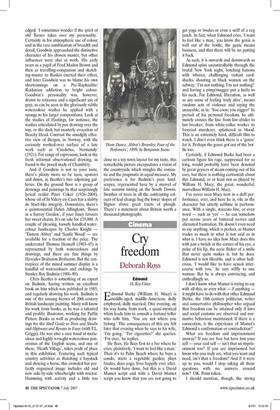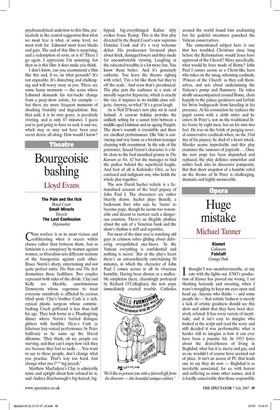Cry freedom
Deborah Ross Edmond 18, Key Cities -E'dmond Burke (William H. Macy) is 4 I ' middle-aged, middle-American, dully employed, dully married. One evening, on his way home from work, a quasi-mystical whim leads him to consult a fortune-teller who tells him, 'You are not where you belong.' The consequences of this are felt later that evening when he says to his wife, 'I'm going.' For cigarettes?' she queries. Tor ever,' he replies.
He flees. He flees first to a bar where he cries, plaintively, 'I want to feel like a man.' Then it's to Palm Beach where he buys a condo, starts a vegetable garden, plays boules, does yoga, lives happily ever after. Or would have done, but this is a David Mamet script and with a David Mamet script you know that you are not going to get yoga or boules or even a sniff of a veg patch. In fact, when Edmond cries, 'I want to feel like a man,' you know the genie is well out of the bottle, the genie means business, and that there will be no putting it back.
As such, it is onwards and downwards as Edmond spins uncontrollably through the brutal New York night, botching liaisons with whores, challenging violent cardsharks, shouting at black women on the subway, `I'm not nothing, I'm not nothing!' and having a pimp/mugger put a knife to his neck. For Edmond, liberation, as well as any sense of feeling 'truly alive', means random acts of violence and saying the unsayable, as in: 'You coon; you nigger!' In pursuit of his personal freedom, he ultimately crosses the line from law-abider to law-breaker; from white-collar worker to frenzied murderer, splattered in blood. This is an extremely hard, difficult film to watch. I don't even think there is a 'genre' for it. Perhaps the genre got out of the bottle too.
Certainly, if Edmond Burke had been a cartoon figure his rage, suppressed for so long, would probably have been denoted by great geysers of steam coming out of his ears, but there is nothing cartoonish about this Edmond, or at least not as played by William H. Macy; the great, wonderful, marvellous William H. Macy.
I've never seen Macy turn in a duff performance, ever, and here he is, vile as the character but utterly sublime in performance. With a single, staccato line, or even word — such as 'yes' — he can somehow put across years of battered nerves and alienated frustration. He doesn't even need to say anything, which is perfect, as Mamet trades as much in what is not said as in what is. I have no idea how Macy does this with just a twitch at the corner of his eye, a pulse of his lip, the eerie flicker of a smile that never quite makes it, but he does. Edmond is not likeable, and is often ludicrous. 'I would like to have sexual intercourse with you,' he says stiffly to one woman. But he is always convincing, and enthrallingly so.
I don't know what Mamet is trying to say with all this, or even what — if anything — it might have to do with that other Edmund Burke, the 18th-century politician, writer and conservative philosopher who argued that freedom can be attained only if laws and social customs are observed and normative behaviour maintained. If there is a connection, is the experience of Mamet's Edmond a confirmation or contradiction?
What are freedom and imprisonment anyway? If you are free but have lost your self — your real self — isn't that an imprisonment too? If you are imprisoned but know who you truly are, what you want and need, isn't that a freedom? And if it were up to you, would I stop asking all these questions with no answers around now? OK. Point taken.
I should mention, though, the strong psychoanalytical undertow to this film, particularly in the central suggestion that what we most fear is what, at some level, we most wish for. Edmond most fears blacks and gays. The end of this film is surprising, and a redemption of sorts, or is it? There I go again. I appreciate I'm annoying, but then so is this film: it does make you think.
I don't know, can you recommend a film like this and, if so, on what grounds? It's not enjoyable. It's disturbing and challenging and will worry away at you. There are some funny moments — the scene where Edmond demands his ten-bucks change from a peep-show artiste, for example — but there are more frequent moments of shocking brutality and degradation. But, that said, it is its own genre, is peculiarly riveting, and is only 87 minutes. I guess you're just going to have to suck it and see, which may or may not have been your secret desire all along. How would I know?




















































 Previous page
Previous page